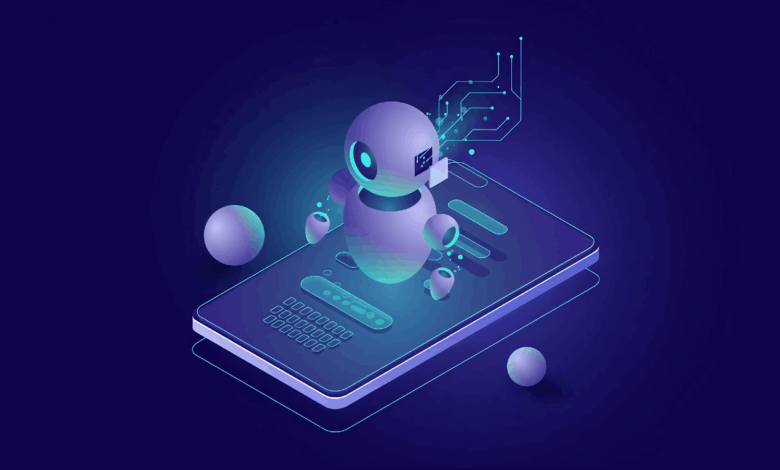
Artificial Intelligence (AI) has evolved from a buzzword to a backbone of modern mobile applications, redefining how businesses connect, serve, and scale. According to a recent PwC report, AI could contribute up to $15.7 trillion to the global economy by 2030, with mobile and enterprise apps driving a large part of this growth.
This shift is not just about automation AI app development for business is enabling smarter decisions, real-time user engagement, and scalable personalization like never before. As competition intensifies, companies embracing business app development with AI are future-proofing their offerings and gaining a serious edge.
In this blog, we’ll explore the role of AI in business app development, its practical use cases, benefits, and the strategic steps to adopt AI in your mobile roadmap, so you’re not just keeping up, but staying ahead.
What Is AI App Development in the Business Context?
AI app development for business refers to the integration of artificial intelligence technologies into mobile or web applications with the goal of improving functionality, efficiency, and decision-making. Unlike traditional apps that follow static, rule-based commands, AI-powered apps are capable of learning from data, adapting to behavior, and making intelligent predictions or recommendations in real time.
The distinction is clear when we look at business app development with AI versus basic automation. Rule-based systems follow fixed instructions. In contrast, AI applications utilize advanced technologies such as:
- Machine Learning (ML): Enables the app to learn from historical and real-time data and improve outputs without being explicitly programmed.
- Natural Language Processing (NLP): Helps apps understand and interact with human language used in voice assistants, chatbots, and more.
- Computer Vision (CV): Enables visual data recognition used in scanning, identification, and AR features.
These capabilities are not just theoretical, they’re driving real transformation. AI in business mobile app development is now powering applications like predictive CRMs that suggest sales actions, virtual financial advisors that automate portfolio management, and eCommerce tools that recommend products based on past behavior.
Some real-world examples include:
- A predictive analytics dashboard that helps sales managers identify likely-to-convert leads
- AI-powered chat assistants embedded in customer service apps for 24/7 support
- Personal finance apps using ML models to suggest budgeting habits
The role of AI in business app development goes far beyond simple automation. It’s about making your applications more proactive, adaptive, and capable of handling complex decision-making, all within an intuitive user experience. Businesses that embed AI into their app ecosystem are not only improving operations but also setting themselves apart in a competitive digital space.
Why Are Businesses Adopting AI in Mobile App Development in 2025?
Businesses today need more than functional apps, they need intelligent solutions that evolve with user needs. AI app development is reshaping how companies engage, operate, and grow. From personalization to automation, the role of AI in app development is becoming essential for building smarter, more efficient, and future-ready digital products. Let’s explore the key drivers behind this widespread adoption of AI in mobile app development in 2025.
Real-Time Decision Making and Predictive Insights
Modern businesses are flooded with data from user interactions and behavioral patterns to financial metrics and operational performance. The real challenge isn’t collecting this data but turning it into meaningful action. That’s where AI makes the biggest impact.
AI-powered business apps can process real-time data and deliver instant insights. For instance, a retail app can predict which products a user is likely to purchase based on browsing patterns, inventory availability, and seasonality. A logistics app can dynamically adjust routes based on live traffic data, reducing delivery times and operational costs.
With AI, decision-making moves from reactive to proactive. It allows business leaders to spot opportunities, identify risks, and respond faster all within the app itself. This is why AI app development for business is increasingly prioritized in strategy roadmaps.
AI for Hyper-Personalized Customer Experience
Generic experiences no longer cut it. Users expect apps to understand their preferences and behavior. AI helps businesses deliver hyper-personalized journeys across various touchpoints.
Whether it’s content, product recommendations, notifications, or support AI ensures each element is tailored to the user. For example, a streaming platform can curate playlists based on mood, time of day, or past listening habits. A fitness app can offer customized workout plans by analyzing user progress, activity history, and biometric data.
This level of personalization improves user satisfaction, increases engagement, and ultimately boosts retention. That’s why business app development with AI is becoming a necessity especially in industries like retail, fitness, education, and entertainment where user experience defines success.
Operational Efficiency Through Automation
One of the most significant benefits of integrating AI into mobile applications is automation. By minimizing human involvement in routine tasks, AI allows businesses to free up valuable time and resources for strategic initiatives.
In mobile apps, automation can handle everything from processing orders, scheduling appointments, categorizing support tickets, to generating reports. For instance, in a finance app, AI can categorize transactions, flag anomalies, and generate automated expense reports. In healthcare, it can manage appointment bookings, medication reminders, and patient record updates.
The outcome? Faster operations, lower costs, and improved accuracy, all of which contribute to long-term scalability. Businesses implementing AI in business mobile app development are seeing significant reductions in operational friction and overheads.
AI-Driven Security and Fraud Detection
Security is one of the most critical concerns for businesses with digital products. With increasing data breaches and evolving cyber threats, apps must be built to proactively detect and defend against risks.
AI algorithms are capable of detecting suspicious activity, unusual patterns, and potential breaches before they escalate. Moreover, AI-powered facial recognition and biometric authentication are making apps more secure without compromising on user convenience. For any business operating in fintech, healthcare, or e-commerce, AI in mobile apps is now seen as an essential layer of defense.
This underscores the role of AI in business app development, not just as a feature, but as a foundational element of digital security and compliance.
Competitive Differentiation in Crowded Markets
With millions of apps available in app stores, simply having a mobile presence isn’t enough. Businesses need a way to stand out and AI delivers that edge.
Apps with AI capabilities not only provide a better experience but also offer unique value propositions. Think of customer support chatbots that resolve queries instantly, AI content tools that tailor newsletters based on user reading habits, or sales dashboards that adapt layouts based on the user’s decision-making patterns.
These differentiators aren’t just technical bells and whistles. They impact reviews, retention, app ratings, and ultimately, revenue. In fact, many companies are now marketing their apps based on embedded AI features. The shift is clear AI app development for business is becoming a brand and trust-builder.
Enhanced Voice and Visual Interaction Capabilities
The way users interact with apps is changing rapidly. Typing and tapping are no longer the only options voice and vision are taking center stage.
With AI-powered Natural Language Processing (NLP) and Computer Vision (CV), mobile apps are becoming more accessible, responsive, and intuitive. Voice-based assistants like Google Assistant or Alexa have changed how people search, command, and engage. Businesses are now embedding similar capabilities into their own apps.
These capabilities enhance user engagement, speed, and inclusivity giving companies the tools to tap into new audiences and user preferences.
Top Use Cases of AI in Business App Development
AI is not just reshaping backend processes, it’s transforming how businesses interact with users, make decisions, and scale services. The rise of AI app development for business has unlocked a wide range of use cases, helping organizations increase revenue, reduce costs, and improve customer satisfaction through real-time intelligence and automation. Let’s explore the top five AI-powered features that are driving impact across industries in 2025.
Smart Chatbots and Conversational Interfaces
AI-driven chatbots have become a cornerstone of modern business app development with AI. Unlike traditional bots with scripted responses, intelligent conversational agents use Natural Language Processing (NLP) to understand context, sentiment, and intent enabling real-time, human-like communication.
These chatbots can handle customer support, lead qualification, onboarding, and even internal HR processes. For instance, in banking apps, chatbots now assist users with balance checks, fraud alerts, and transaction details.
By integrating smart chatbots, businesses not only improve user experience but also reduce dependency on live support agents, making operations more efficient and scalable.
Intelligent Product Recommendations and Upselling
E-commerce and content-driven apps are leveraging AI in business mobile app development to offer hyper-personalized product recommendations. By analyzing user behavior, purchase history, and contextual signals, AI engines can display the most relevant products or content at the right moment.
This increases conversion rates and drives upselling. A popular use case includes AI suggesting complementary products (like shoes with a dress or accessories with a gadget), which significantly boosts average order value.
According to recent studies, personalized product recommendations now drive up to 26% of revenue for eCommerce companies highlighting the tangible ROI of AI-led personalization.
Demand Forecasting and Inventory Optimization
Retail, supply chain, and logistics-based businesses are using AI-powered apps for smarter inventory planning. By analyzing historical sales data, seasonality, location trends, and external factors like weather or events, AI models forecast product demand with impressive accuracy.
This enables businesses to maintain optimal stock levels, avoid overstocking or stockouts, and reduce warehousing costs. In manufacturing, AI apps can also predict raw material requirements and automate replenishment alerts streamlining the full supply chain.
AI for User Behavior Tracking and Retention
Understanding how users engage with your app is key to product success. AI can track tap paths, screen time, feature usage, drop-off points, and engagement metrics to reveal patterns that aren’t obvious through traditional analytics.
With this insight, businesses can personalize onboarding, redesign complex workflows, and launch targeted re-engagement campaigns. For example, a SaaS app can detect when a user is likely to churn and trigger automated help tips, offers, or support outreach.
These intelligent retention strategies, powered by AI, are becoming critical to reduce churn in subscription-based models.
AI-Powered Content Generation and Summarization
Whether it’s news apps, e-learning platforms, or internal dashboards, content overload is a real challenge. AI solves this by generating or summarizing content in real time based on user preferences and context.
Business apps are using Natural Language Generation (NLG) to auto-generate reports, write personalized updates, or simplify complex data insights. For example, a project management tool can now auto-summarize weekly team updates, while a news app can summarize long articles into quick reads. This not only saves time but also increases content accessibility in today’s fast-paced business environments.
Benefits of AI-Powered Apps for Modern Businesses
As we move deeper into the digital-first era, AI is no longer just a feature, it’s becoming the foundation of modern business apps. Companies investing in AI app development for business are gaining not only a competitive edge but also operational and strategic advantages that traditional applications simply cannot offer. Here are the key benefits that AI-driven mobile apps deliver in today’s business environment.
H3: Enhanced User Experience and Engagement
The core of any successful business app is its ability to understand and serve users intuitively. AI enables apps to adapt based on real-time inputs, user behavior, and individual preferences. Whether it’s adjusting the UI dynamically, recommending content, or simplifying navigation AI makes apps feel smarter and more responsive.
This results in longer session times, higher customer satisfaction, and increased app loyalty. For businesses focusing on customer-centric growth, business app development with AI offers the ideal foundation to build immersive and engaging digital experiences.
Reduced Operational Costs Over Time
One of the biggest advantages of AI in business mobile app development is long-term cost efficiency. By automating repetitive workflows like customer support, scheduling, report generation, or fraud detection AI reduces the need for constant manual intervention.
Over time, this leads to significant savings on staffing, infrastructure, and error correction. Businesses also avoid operational bottlenecks and service delays, resulting in smoother processes and better resource allocation.
Better Decision Support for Teams
AI-powered apps act as intelligent assistants analyzing large volumes of structured and unstructured data to surface relevant insights. Sales managers can get deal-closing predictions, HR teams can receive churn warnings, and operations leaders can be alerted about inefficiencies.
By equipping teams with data-backed guidance at the point of decision, AI app development transforms gut-feel decision-making into insight-driven execution. This leads to better outcomes and a more strategic approach to growth.
24/7 Service Capabilities
AI doesn’t sleep and that’s a huge win for businesses with global users or high service demand. Chatbots, virtual assistants, and automated responders ensure your app can serve users around the clock, without burnout or downtime.
This continuous availability improves user trust and ensures timely support, even during peak hours or in different time zones. For industries like eCommerce, healthcare, and fintech, where response time matters, AI in mobile app development is a key enabler.
Data-Driven Product Innovation
Every tap, scroll, and pause in your app generates data. AI doesn’t just collect this data it learns from it. This allows businesses to understand what users want, which features are performing, and where there’s friction.
Product teams can then iterate faster, launch better features, and test improvements based on actual behavior not assumptions. This makes AI a crucial component of modern product development strategies, where speed and relevance are everything.
Scalable Personalization at Every Stage of the Funnel
AI allows businesses to personalize not just the landing page or recommendations but every touchpoint in the customer journey. From onboarding messages to pricing offers, from push notifications to post-purchase follow-ups, AI can adapt each experience to the user’s needs and stage in the funnel.
This personalization drives better conversion rates, improves customer lifetime value, and nurtures deeper brand relationships. It’s a key reason why the role of AI in business app development is central to digital transformation across industries.
Challenges in Integrating AI in Business Apps (And How to Overcome Them)
While the benefits of AI app development for business are substantial, implementing AI into mobile applications comes with its share of challenges. These obstacles are often not due to the technology itself but the preparation, planning, and long-term management required. Here are the key hurdles businesses face along with practical solutions to overcome them.
Data Privacy and Security Concerns
AI thrives on data, which means your application must collect, process, and analyze significant user inputs. However, with increasing global regulations like GDPR, HIPAA, and India’s Digital Personal Data Protection Act, data security is no longer optional.
Businesses investing in AI in business mobile app development must embed robust privacy protocols. This includes anonymizing user data, ensuring consent management, and using encryption at every level. Partnering with AI development providers experienced in compliance and secure infrastructure design is vital to mitigate these risks.
Model Training and Maintenance Overhead
Unlike standard code, AI models need constant monitoring, retraining, and updates to remain accurate. Over time, model performance can drift due to changes in user behavior, data inconsistencies, or emerging use cases.
To manage this, businesses must plan for long-term AI maintenance and versioning. Using AutoML platforms or pre-trained APIs can help in the early stages, while scalable AI ops tools ensure consistent accuracy in full-scale business app development with AI.
Talent Gap in AI-Ready Teams
Hiring or upskilling teams with AI capabilities is a major roadblock. ML engineers, data scientists, and AI architects are in high demand but short supply. Without the right skillset, projects can face delays or poor outcomes.
Companies can address this by working with external development partners who specialize in AI app development, or by starting with low-code/no-code AI platforms that offer plug-and-play intelligence. Long-term success requires a hybrid approach: internal ownership with expert external collaboration.
Managing Cost vs. ROI Expectations
AI can offer massive returns but it also comes with upfront investment. Businesses often struggle to balance the cost of implementation with expectations for immediate impact.
The solution is to start with focused use cases that deliver visible, short-term wins. Don’t build a complex AI system from day one. Instead, roll out incremental features, track KPIs, and reinvest savings into further AI adoption. Strategic planning ensures that the role of AI in business app development stays value-driven, not cost-heavy.
How to Get Started with AI in Your Business App Development Strategy?
Implementing AI is no longer just a tech decision, it’s a business strategy. Whether you’re building a new app or modernizing an existing one, here’s how to begin your journey toward successful AI app development for business.
Define Clear Use Cases and Business Outcomes
Start with clarity. What problems are you solving? What will AI improve speed, accuracy, personalization, or automation? Define measurable goals and prioritize use cases that align with your business model.
For example, reducing customer service wait time or improving product discovery through AI-based search. This approach ensures you’re investing in business app development with AI that drives real, measurable value from day one.
Choose the Right AI Capabilities for Your App
Not every app needs deep learning or image recognition. Depending on your use case, consider AI types like NLP for chatbots, ML for prediction, or CV for visual analysis. Choosing relevant AI capabilities based on goals keeps development efficient and cost-effective. It also avoids overengineering, ensuring the app remains user-friendly and performance-optimized.
Build a Scalable Data Infrastructure First
AI relies on clean, structured, and regularly updated data. Without the right data pipelines, even the most powerful AI won’t deliver results. Before diving into features, invest in backend readiness data labeling, API architecture, cloud storage, and analytics. Think of your data foundation as the engine behind every intelligent feature in AI in business mobile app development.
Collaborate with AI-Ready Development Partners
One of the smartest moves is to work with experienced partners who understand both AI technology and business context. The process to find dedicated developers with proven AI expertise is crucial to execution. From strategy to deployment, such partners help avoid costly mistakes, accelerate development, and ensure compliance making the benefits of hiring dedicated developers extend directly into AI implementation success.
Monitor Performance and Iterate with Feedback
AI models evolve and your business should too. Post-launch, track metrics like engagement, conversions, or efficiency improvements. Use A/B testing, user feedback, and error rates to tweak features regularly. This iterative mindset ensures that the role of AI in business app development remains dynamic, value-focused, and aligned with changing business needs.
Conclusion
Choosing the right AI development path can define your product’s future. AI-powered apps aren’t just about innovation they drive deeper personalization, operational efficiency, and data-backed decisions that modern businesses demand. What sets high-impact apps apart is not just the technology used, but the strategy behind its integration.
As companies aim to future-proof their offerings, aligning AI capabilities with real business goals is critical. From predictive insights to automated workflows, the value of AI app development for business lies in solving meaningful problems scalably and intelligently.
Achieving this requires more than tools; it needs the right vision, execution, and partnership. That’s where experts like DevStory step in helping businesses map AI potential, define the right features, and deliver high-performance apps that adapt and evolve.




